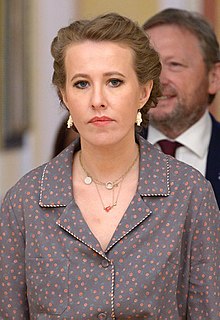A Quote by Vladimir Putin
This is not only a matter of relations between Russia and the United States. In my view, any restrictions in the economic sphere that are dictated by considerations of political expediency are extremely harmful for the world economy as a whole. This destroys unity and the rules of the game.
Related Quotes
Then there is another area of activity - economic interaction between Russia and the United States. Right now, for example, it has already been made public that we signed a large deal to privatise one of our biggest oil and gas companies, Rosneft. We know for sure that US companies, as well as Japanese ones, by the way, are keenly interested in cooperation in Russia's oil and gas sector, in joint work. This has immense significance for world energy markets and will directly affect the whole world economy.
In 2006, I became the fist American to be allowed to go visit their astronaut center in China in Beijing. I think that it makes sense for the U.S. to work with China in the future and I hope to see, if the political atmosphere between the United States and China allow for us to do more cooperation together, especially in the area of human space flight. I think in the same way that it's help improve the relations between the U.S. and Russia; it would help to improve the relations between the U.S. and China.
If you want to see where Trump is moving, look at what the United States neoliberals advised Russia to do after 1991, when they promised to create an ideal economy. Russia was under the impression that the neoliberal advisors were going to make Russia as rich as the United States. What they really did was create a kleptocracy that was virtually tax-free.
In many respects, the United States is the freest country in the world. I don't just mean in terms of limits on state coercion, though that's true too, but also in terms of individual relations. The United States comes closer to classlessness in terms of interpersonal relations than virtually any society.
If [Western] relations with Russia are to be friendly, they must be open and sincere, otherwise there can be no friendship at all. That means one should be able to speak openly about everything at meetings and conferences. It shouldn't be that we can't discuss the killing of journalists in Russia, or the suppression of human rights, or all the warning signs surfacing in Russia because of oil and gas or other economic reasons. It's a big problem, but it's the same in Western relations with Arab states.
If the resources of different nations are treated as exclusive properties of these nations as wholes, if international economic relations, instead of being relations between individuals, become increasingly relations between whole nations organized as trading bodies, they inevitably become the source of friction and envy between whole nations.
In the United States, Iran is nothing but a whipping-boy. Few Americans have any real use for Iran. Most of us, what we know and remember about Iran are things like the hostage crisis in 1980, or they think about the Iranian attacks in Lebanon, or on the Khobar Towers. So you don't get a whole lot of political mileage in the United States by going out and advocating better relations with the Iranians.
In the Islamic world, the U.S. is seen in two quite different ways. One view recognizes what an extraordinary country the U.S. is.The other view is of the official United States, the United States of armies and interventions. The United States that in 1953 overthrew the nationalist government of Mossadegh in Iran and brought back the shah. The United States that has been involved first in the Gulf War and then in the tremendously damaging sanctions against Iraqi civilians. The United States that is the supporter of Israel against the Palestinians.































